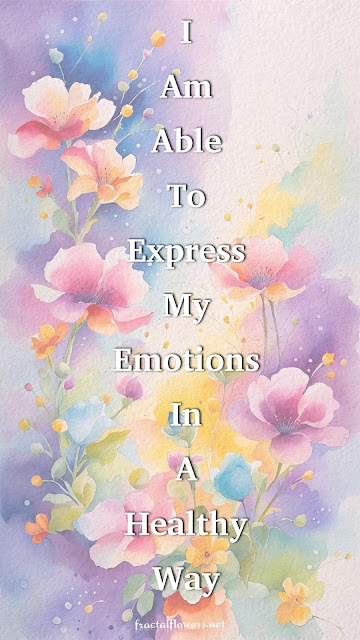Emotions are an integral part of the human experience, influencing our thoughts, behaviors, and overall well-being. While it's natural to feel a wide range of emotions, how we express and manage them plays a crucial role in our emotional intelligence. Healthy emotional expression involves self-awareness, understanding our emotions, and effectively communicating them. In this article, we will explore the significance of self-awareness and its connection to emotional intelligence, as well as provide practical tips for expressing emotions in a healthy manner.
Affirmation: I Am Able to Express My Emotions in a Healthy Way (Right-click for loop mode)
Free Affirmation Card: Right-click and save for your personal meditation)
The Importance of Self-Awareness
Self-awareness serves as the foundation for healthy emotional expression. It involves understanding our own emotions, recognizing their triggers, and acknowledging how they impact our thoughts and actions. By cultivating self-awareness, we gain insight into our emotional patterns, strengths, and areas for growth. This awareness empowers us to respond to our emotions in a more constructive and balanced way.
Emotional Intelligence and Healthy Expression
E motional intelligence encompasses the ability to recognize, understand, and manage our emotions, as well as empathize with others. It is closely intertwined with self-awareness and plays a vital role in our personal and professional lives. When we express our emotions in a healthy manner, we enhance our emotional intelligence, leading to improved relationships, decision-making, and overall well-being.
Strategies for Healthy Emotional Expression
Here are various strategies you may use to ensure you are expressing your emotions in a healthy and helpful way.
Recognizing and labeling emotions: Developing the skill to identify and label our emotions accurately is essential. This allows us to understand the underlying causes and respond appropriately.
Practicing self-reflection: Engaging in regular self-reflection helps us gain insight into our emotional responses. Journaling, meditation, or seeking therapy can aid in this process, enabling us to explore and process our emotions in a safe and supportive environment.
Effective Communication Using 'I' Statements: Expressing emotions in a healthy way involves effective communication. It is important to express ourselves assertively, using "I" statements to convey our feelings without blaming or attacking others. Active listening and empathy are also crucial components of effective communication.
Seeking support: Building a support network of trusted individuals who can provide emotional support and guidance is invaluable. Sharing our emotions with loved ones or seeking professional help can help us navigate challenging situations and gain perspective.
Engaging in self-care: Prioritizing self-care activities such as exercise, relaxation techniques, and hobbies can help manage stress and promote emotional well-being. Taking care of our physical and mental health allows us to better regulate our emotions.
Conclusion
Expressing emotions in a healthy way is a fundamental aspect of emotional intelligence. By cultivating self-awareness, understanding our emotions, and effectively communicating them, we can enhance our emotional well-being and build stronger relationships. It is a continuous journey that requires practice and self-reflection. By embracing healthy emotional expression, we empower ourselves to navigate life's challenges with resilience and authenticity, ultimately leading to a more fulfilling and balanced life.















No comments:
Post a Comment